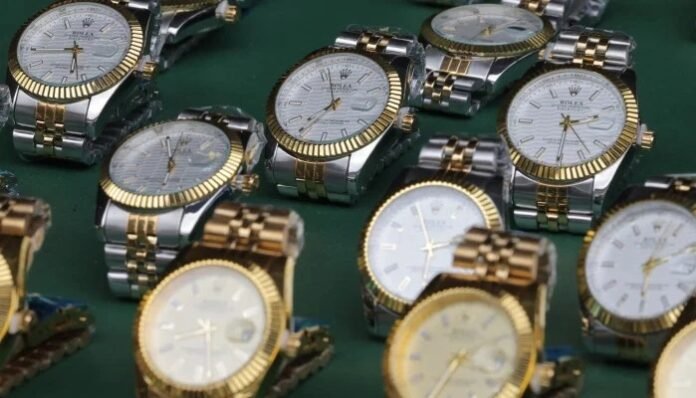
In the heart of Paris, the courtroom drama unfolds as Julien V., a 30-year-old Frenchman hailing from the picturesque city of Nice, faces the consequences of orchestrating a sophisticated web of counterfeit luxury watch sales.
Accused of masterminding a scheme that spanned continents, Julien V. has become the focal point of a trial shedding light on the lucrative underworld of replica timepieces.
Nicknamed “the prince of fake,” Julien V. has openly admitted to authorities his role in the illicit trade, confessing to orchestrating the sale of thousands of counterfeit luxury watches, primarily imitations of the revered Swiss brand Rolex.
Operating from the exotic shores of Thailand, Julien V. coordinated a network of production in China, churning out up to 10 watches per day, ultimately amassing a staggering turnover of three million euros ($3.3 million) between 2019 and 2022.
However, experts suggest that the scope of Julien V.’s operation may have been far grander than initially revealed.
Michel Vittini, a watch specialist quoted in the Nice-Matin newspaper, asserts that the accused may have peddled upwards of 50,000 fake Rolexes, a figure that underscores the scale of the counterfeit enterprise.
What’s particularly alarming is Julien V.’s claim that his replicas were crafted with such precision that they were virtually indistinguishable from authentic Rolex timepieces.
With a keen understanding of customer satisfaction, he boasted the ability to tailor the degree of authenticity to meet the desires of his clientele.
The pricing strategy employed by Julien V. further underscores the sophistication of his operation.
A high-quality China-made replica fetched 500 euros, with additional premiums for features such as engraved serial numbers or genuine automatic mechanisms, reaching as high as 6,500 euros.
Remarkably, custom-made timepieces comprised entirely of genuine parts could command prices soaring up to 60,000 euros, a testament to the allure of counterfeit luxury in the eyes of consumers.
The ramifications of Julien V.’s enterprise reverberated beyond national borders, capturing the attention of Swiss watchmakers who dispatched private investigators to dismantle the illicit network.
Ultimately, it was the arrest of Julien V.’s online resellers that precipitated his own apprehension by authorities.
During the trial proceedings, Julien V., exhibiting a brazen demeanor, has assumed control of his own defense against a formidable array of legal representatives representing several Swiss luxury watchmakers.
Despite his humble beginnings as a pizza delivery man, Julien V. claims to have amassed considerable wealth, purportedly holding 4 million euros in cryptocurrency and boasting ownership of extravagant assets including a Lamborghini and multiple properties in Thailand.
Operating with a degree of cunning, Julien V. executed his sales strategy through encrypted messaging platforms, circumventing French customs by routing shipments through Germany before infiltrating the borders into France.
In a startling admission, one of Julien V.’s accomplices, Florian R., confessed to purchasing fake Rolexes for 200 euros and reselling them for a modest markup, asserting, “These are fakes, I don’t cheat people.”
As the trial unfolds, the fate of Julien V. hangs in the balance, with the verdict slated for March 20th.
Amidst the legal proceedings, the case serves as a cautionary tale, underscoring the pervasive nature of counterfeit commerce and the profound implications for both consumers and legitimate industries alike.
This article was created using automation technology and was thoroughly edited and fact-checked by one of our editorial staff members